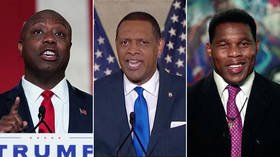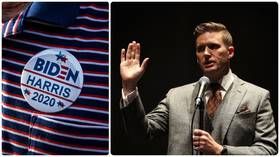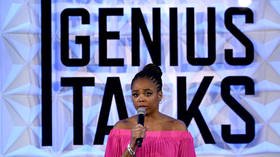'Liberals' excuse to say the n-word'? 'Uncle Tom' trending as disaffected RNC viewers fail at mocking convention's speakers

The first day of the RNC featured a slate of black and female speakers. The party's Twitter critics said these people betrayed their race and gender, calling them “Uncle Tom's” to the dismay of US conservatives.
The Republican National Convention's Monday lineup featured speakers like US Senator Tim Scott, Congressman Vernon Jones and former NFL player Herschel Walker, who are all African Americans and were accused of being “Uncle Tom's”. Their critics who use this derogatory term believe that they were betraying the black community by aligning with the Republican party and President Donald Trump.
“Uncle Tom” is a common trope used to degradingly describe African American conservatives in the US. Notably, following the RNC the term began trending nationally on Twitter without any hashtag or other means of user coordination.
#VernonJones is another uncle tom that doesn't mind having kkk pulling his chain.
— Steven Velez (@Stevenvelez) August 25, 2020
Herschel went full on Uncle Tom I see. Not surprised.
— shakima reels (@Kebo_Slice) August 25, 2020
@TimScottSC you’re and Uncle Tom! You need to wake the fuck up!
— American (@shunjones73) August 25, 2020
Some critics even went after the women speakers. They suggested that ex-UN Ambassador Nikki Haley and Congressional candidate Kim Klacik were “female Uncle Tom's”, betraying other women by supporting Trump.
The “Uncle Tom” comments did not go unnoticed by conservatives of color themselves. They dubbed the expression a “racist slur” and a substance-free critique of their positions as its use supposedly implies that black people can't choose a political side by themselves.
Uncle Tom is the liberals excuse to say the n-word.
— Black Rebel (Andrew Duncomb) (@SpaceForceUSA_) August 25, 2020
"Uncle Tom"When a black conservative is making valid points and arguments for small Government individual liberty.White leftists: pic.twitter.com/4oChJyhiKh
— Kajuan2g6 (@Kajuan2g6) August 25, 2020
Uncle Tom was originally a slave character from an 1852 anti-slavery US novel “Uncle Tom's Cabin” by Harriet Beecher Stowe. The name became a stand-in for oppression conformism due to the character’s nonresistance approach to slavery.
People who use the term are often criticized for ignoring the book's full story, at the end the title character gives his life to protect runaway slaves.
White liberals sit down 🙄 if you have read the book, you know Uncle Tom is the hero.
— Tasha J (@SomeBlackGirl91) August 25, 2020
If you like this story, share it with a friend!















